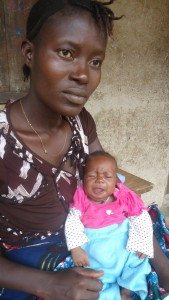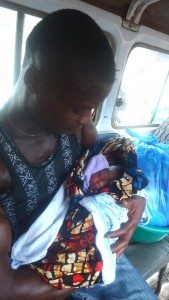The Life of the Flesh: Part III
Post Prologue
In Part II of this series, I wrote an epilogue in which I tell about a mother who lost her life in child birth. Pictured below is her baby daughter who is now being raised by her father’s sister, Howah. To help baby Maria and her Auntie Howah, we are providing formula in the hopes that Maria will grow strong and beat the odds which are stacked against her: one in four children born in Sierra Leone don’t reach their fifth birthday.
I had not intended to write a third article in this series. Initially I was just writing about our dear friend Beatrice and commemorating the one-year anniversary of survival against her own daunting odds: one in 30 women in Sierra Leone will die from complications of pregnancy and child birth.
But this sad statistic has struck close to home again and I believe the story warrants being told. Thus we have Part III in this series.
✥✥✥
On Friday, August 7, I received a phone call around 5 pm. When I saw Stephen’s name on the phone screen I immediately became concerned; it was 9 pm in Sierra Leone and he would only be calling because of an emergency. Upon hearing his first words, “I’m in Yele[YEE-lay],” I knew that meant he was at Lion Heart hospital. My heart continued to sink as I tried to imagine what the problem could possibly be. He then began his tale.
He had been walking through town on the regular circuit of Friday evangelism and was making his way toward home late in the afternoon. Our dear friend, Michael Sillah, husband to Beatrice mentioned above, came running to catch up with him and told him of yet another young woman having birthing complications; would he take her to the hospital, was Michael’s earnest plea. The baby had been delivered but the placenta was not separating; this woman was rapidly losing blood and would soon bleed to death if not transported to the hospital where they could stabilize her and remove the placenta.
Stephen quickly went home, gathered a few things and was off in our truck/ambulance to pick up the woman at the town clinic. There he found a confused new father who was clutching the tiny bundle of life while watching his wife’s life slipping away; the joy of the birth darkly overshadowed by the pain of his impending loss. Stephen got the father and baby settled in the back of the truck and then the mother was carried out in an improvised stretcher.
August and September are the peak months of our intense rainy season and the road to Yele had become a horrible rutted mess with some palm log bridges being nearly washed out. The ride was taxing on everyone and Stephen was exhausted by the time he called to ask for prayer. After arriving at the hospital the critically ill woman first had to be screened for the Ebola virus as a standard precaution but as they waited for the results her condition became so critical that she was admitted and stabilized. Thankfully the blood test came back clear; she was Ebola free and they could now safely proceed with evaluating her condition. Stephen said he’d get back to me when he could. We waited and prayed for the mother’s life to be spared.
Hours later the call came. His usual cheery self, Stephen told me what had transpired.
The mother was stabilized but she was in critical need of blood. But the father and the few friends who had accompanied him were not a match. The doctor advised that everyone go home, get some rest, and return the next morning with other people from our village who would be willing to have their blood typed to see if they could donate a unit for the dying mother. This small hospital has no blood storage facility and making the difficult trip to the closest blood bank in Makeni was out of the question at this late hour. Downcast, the father reluctantly agreed seeing no other option. It was then that Stephen spoke up. He knew he had the same type of blood as the mother and quickly offered a pint of his own blood. Encouraged, the young father brightened as now there was some hope that his wife would live.
With the unit of blood in her body, the mother was now stable enough to have surgery the following morning when they would remove the placenta and afterbirth. It was midnight in Sierra Leone when Stephen called to relay all of this to me and say that he now had to contend with the long ride home. Undaunted, he chuckled and said good night. It’s rare that I see him truly down and his enthusiasm in the face of difficulties is motivating.
Two weeks following this incident, Stephen was working outside when Moses Menjor came up our driveway. He’s one of the few people whom the dogs will allow onto the property and had come to ask if Stephen could take some time to receive a small group of people who had come to greet him. He stopped his work and went to the veranda as Moses went back down the hill to escort the visitors. The small contingent was from a village beyond ours. They were family of the surviving mother and had come to express their deep, heart-felt gratitude to Stephen for his life-saving kindness. They informed him that they wished to name the baby girl after his wife in appreciation for what he had done to ensure that the child had a mother to raise her.
In his mind, Stephen was picturing baby Maria whose mother died for lack of blood and lack of money (see Part II). While we’re glad to help Maria’s Auntie Howah with formula for the child, how much better it would be for her to have her own mother. To Stephen it just was the right thing to do – give his blood. And do we not have the greatest example to follow? – the Lord Jesus Christ, who freely gave His life blood to secure everlasting life for us. “Unto him that loved us, and washed us from our sins in his own blood … to him be glory and dominion for ever and ever. Amen.” (Revelation 1:5-6)






